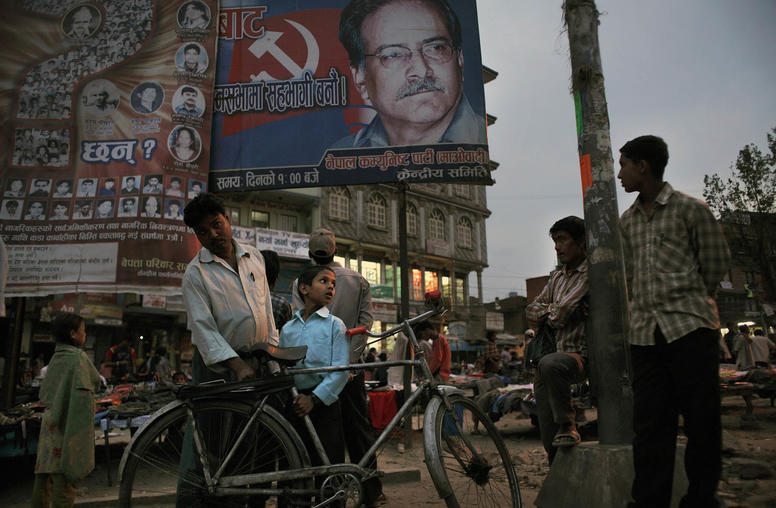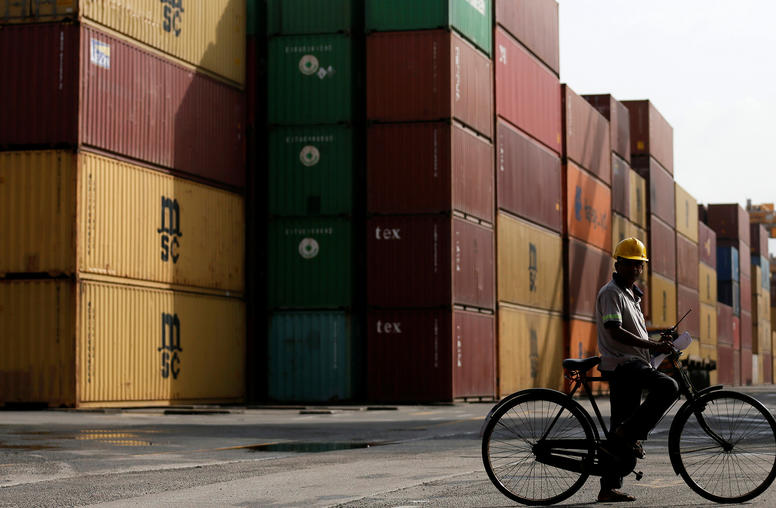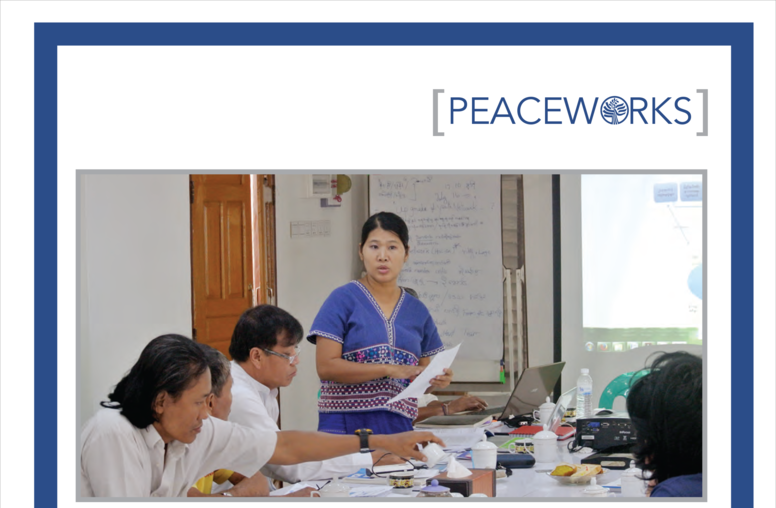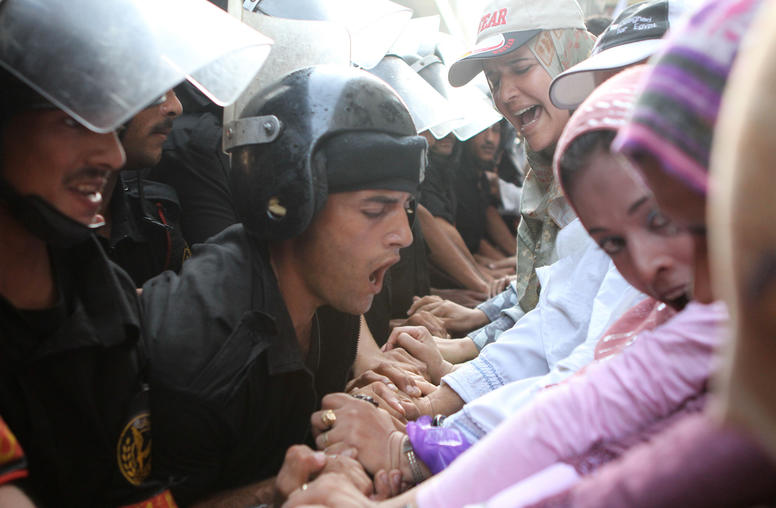Constituent Assembly Elections and Security in Nepal
What are the security challenges Nepal faces in the run up to the November 2007 constituent assembly elections? Lack of resources, the need for training and retraining, violence in the Terai (plains), and increased crime and lawlessness are only a few of the challenges identified through a series of meetings and group dialogue sessions held by USIP.
This USIPeace Briefing highlights the findings regarding the security situation in Nepal in the run up to constituent assembly elections scheduled for November 22, 2007. Since February 2007 the United States Institute of Peace (USIP) has held individual meetings and group dialogue sessions on strengthening security and the rule of law in Nepal. These events have taken place in Washington, D.C., Kathmandu, Banke, Siraha, Kailali, Jhapa, Chitwan and Rupandehi Districts. During the sessions and meetings, including with members of the security sector, challenges and solutions to strengthening security and the rule of law were identified and discussed. While election security for the upcoming Constituent Assembly Election was not the primary subject of the discussions, various participants offered a number of recommendations and raised several concerns. Additionally, general security issues, many of which are related to election security, were discussed and can be included in a broader long-term security strategy.
The Nepal Police (NP), the primary security agency for law and order, has been identified as the key agency responsible for elections security with the Armed Police Force (APF) being deployed as back-up. The APF was initiated in 2000 specifically to combat the armed insurgency that began in 1996 launched by the Communist Party of Nepal - Maoist (CPN-M). One of the concerns regarding election security is the undefined chain of command between the NP and APF, as the APF has generally followed the command of the Nepal Army (NA). The NA, the primary provider for elections security for previous elections, is currently confined to barracks according to the Comprehensive Peace Agreement between the government and the CPN-M. Additionally, the APF has not been trained in election security or law and order operating procedures.
Other challenges to providing election security include lack of resources, the need for training and retraining, violence in the Terai (plains), increase of crime and lawlessness, agitating marginalized groups, small arms, and unmonitored movement of former combatants and their cantonment areas. While this list of challenges is not exhaustive, it does illustrate several political and logistical areas that need to be addressed to provide adequate security for free and fair constituent assembly elections.
Logistical Needs
The following logistical needs, which are only a partial list set forth in order to provide the basis for further discussion, are primarily directed toward the NP as the lead security agency for the elections.
There are a number of logistical and other challenges to providing adequate security during the election period. These challenges include the remoteness of many polling areas, the number of properly trained security personnel needed to provide security, and the presence of violent or agitating groups. Also, there is concern over securing polling stations as well as ballot boxes and ensuring their safe arrival at counting stations in District Headquarters. This concern stems from past election experiences in which polling stations have been encroached upon by large crowds and ballot box tampering, particularly during transport, was common.
Resources such as vehicles and helicopter service, along with sufficient fuel supplies, are needed not only to access remote areas, but also for patrolling during elections. An increase in communication equipment would also advance the NP's ability to direct additional security personnel to areas that may experience rallies or violence, as well as provide means to coordinate their security measures. Similarly, additional office equipment and computers would assist in coordinating efforts and track security trends. While some riot control or crowd control gear is available, the majority of NP do not have appropriate protective gear or less than lethal equipment to act appropriately to riots or mass encroachment of polling stations.
Due to insufficient human resources to provide adequate security for the elections, a mass recruitment drive for temporary police will take place in addition to deploying the APF. Some 70,000 former police, APF, and army personnel are intended to fill the temporary positions. This influx of security personnel requires additional equipment, uniforms, and financial assistance to provide wages.
Training Needs
Given the vast increase of security personnel planned for, intensive training will be needed in election security, police ethics, less than lethal force methods, and crowd and riot control for the new and temporary recruits. This training will also be required for the APF, as they have been primarily trained in counter-insurgency, and therefore there is concern over the APF response to crowds and public disturbances. Similarly, many of the NP have not received this training, or training for maintaining law and order in the post-conflict situation, as they were also part of the unified command that fought against the insurgency.
To reach a saturation level, multiple training efforts will be required so that security forces can effectively implement their role, beyond general law and order functions, in the electoral process. Such training would ideally address the following matters: the elections process, human rights and elections, election law violations, neutral and non-partisan behavior, and the adverse effect security force presence may have if it is too close to polling sites, and appropriate use of force. Specific training in pre- and post-election management and security will be needed for any deployed security agencies, as will special skills training in securing polling stations and transporting ballot boxes.
As such extensive and intensive training is required, the NP will need the resources to begin holding trainings immediately. Training kits that include multi-media equipment, handouts/manuals, and other training tools can be provided, at least in part by foreign assistance. While some security agencies have received training directly from foreign governments and personnel, during meetings and discussions held with USIP there was clear indication that foreign assistance was desired, but not necessarily through direct training provided by foreign actors. Rather, preference was that training be conducted by the NP with technical advice, financial assistance, and logistical support highlighted as the primary areas of potential aid from foreign governments.
Diplomatic and Political Efforts
During discussions and meetings, several avenues for strengthening security were raised, including efforts that could be undertaken at the political level. Addressing all of the issues in this section is certainly a long-term and multi-faceted effort. However, to at least begin that process will help to increase election security. The following includes points that foreign governments can make when the opportunity arises with the government, police, civil society and the public, as well as issues that will need to be considered at the top political level within the Eight Party Alliance (EPA)*. Donors could also assist in implementing some of the suggestions below:
*The Eight Party Alliance is comprised of the parties that worked together for signing the Comprehensive Peace Agreement and are currently in charge of executive decision-making through consensus.
Movements, Armed Groups, and Political Violence
Marginalized groups have begun to organize, gain strength, and agitate in order to be heard and included in the decision-making process. However, some groups have armed themselves and have been carrying out violent acts. It is important to recognize in some cases the leaders of these agitating groups capitalize on the legitimate grievances of the community and exploit the community for the leader's own goal of gaining power. Still other armed groups have emerged to either retaliate against the already existing violence, as splinters of the CPN-M or other armed groups, or to fight in favor of retaining the monarch and Hindu Kingdom status of the country.
The EPA can be encouraged to constructively engage both armed and peaceful agitating groups in dialogue in advance of elections in order to prevent or resolve violence that may disturb free and fair elections. While its current efforts of dialogue with the Madhesi Janadhikar Forum (MJF) and Janajati should continue, the government will, in order to prevent increasing lawlessness and armed movements, need to engage peacefully agitating groups, including those that could potentially turn to violence. Because of how grievances have historically been dealt with in Nepal, as evidenced by the Maoist insurgency, these groups operate under the view that the squeaky wheel (via bandhs* or violence) gets the response.
*Via bandhs are general strikes.
To curb this tendency, it is important for the government to engage in sincere dialogue, create a mechanism for grievances to be heard and look to the best interests of the country and not their own political, economic, and party interests. At the same time, the agitating groups should be encouraged to refrain from violence and bandhs. Mechanisms can be created for agitating groups to build their capacity for non-violent means of assuring their grievances are heard, and how to better articulate demands constructively.
More specifically, some immediate issues stemming from the Madhesi, Janajati, Kamaiya, and Dalit movements, as well as from the "landless people," will need to be addressed promptly. Likewise, there is significant concern over the growing ethnic division generating violence, particularly in the Eastern Terai between the Madhesi (Terai) and Pahadi (hills). There is also potential for increasing religious, communal and caste divisions throughout the country.
Further, such divisions are being sown and fostered by certain factions and political parties (some of whom are known to collaborate with criminal elements to encourage such divisions for their own gain) who see such splitting to their advantage. This could result in irreversible communal, ethnic and religious cleavages, leading to violent repercussions. While the Home Minister has given a deadline of mid-August for armed groups to come to the table for dialogue, it is unclear what the intention or strategy of the government is in regard to these groups.
Political actors who seek power or try to undermine another party's power may stoke the fires of valid discontent (due to political, economic or other historical claims of discrimination). Also, given the history of all political parties resorting to various degrees of intimidation in past elections, the international community and civil society can encourage the political parties to refrain from the use of intimidation and violence, including actions perpetrated through criminal elements and vigilante groups. Civil society can further prioritize mitigating communal, ethnic and other violence that will disturb the elections.
Cantonments, Integration, and YCL
As per the comprehensive peace agreement, the former combatants of the CPN-M's People's Liberation Army (PLA) are in cantonment areas and the verification process is ongoing under the supervision of the UN Mission in Nepal. However, an agreed upon strategy for reintegration and integration of former combatants into society and the security agencies has yet to be developed.
If alternatives to forcefully gaining financial and civic power are not available, former combatants will continue to intimidate, extort, and potentially turn to a more organized form of violence and conflict. While the cantonment areas are in extremely poor condition, and there seem to be few alternatives for livelihood, former combatants have left the cantonment areas and some have continued to extort and intimidate. To decrease the potential for violence and disturbance of the elections, the EPA can initiate, prior to the elections, an action-oriented dialogue on integration. Chances for disturbances from former combatants will decrease if the dialogue is well underway, and efforts to educate and build skills among former combatants are begun in order for them to choose reintegration and a life that does not require violence for sustenance.
The EPA can also develop a consensus on the role of the Maoist affiliated Young Communist League (YCL). If a clear role is agreed upon and made public, with a subsequent clear public directive for the police on this subject from the Home Ministry, then monitoring and control of their activities is possible. However, if the YCL cadre does not follow the specific role given to them, they must be held accountable by their party. However, if their actions are illegal, the police and criminal justice system must be allowed to take appropriate action. By not engaging and discussing the issue of a YCL role, it will only guarantee a counterproductive YCL effort. By at least engaging and forming directives, they can be held accountable and may be a more productive organization.
Supporting Security Initiatives
As the lead agency for law and order, and for the security of the elections, the police require increased resources and support. Some of these resources will also contribute to increasing their morale, such as reinstating paid leave, ensuring adequate food rations that are equal to the other security agencies', supplying sufficient protective gear, and other equipment necessary to effectively do their job. Reestablishing a responsible and responsive police presence throughout the country will require reestablishing police posts. However, this initiative has faced difficulty due to public distrust, organized and armed groups forcing closure of police posts, and sub-standard living conditions at the reestablished posts. Increased training to those police to increase police ethics, community responsibility and cooperation, and n appropriate response to the public, as well increased supplies and resources will be necessary.
However, financial resources and equipment only address a part of the initiative that will be undertaken for election security. Taking into account the history of pre-election intimidation and post-election reprisals, a more effective security plan for the elections will include a pre and post-election strategy that will extend months prior to and after the elections. Also, the Home Ministry and Election Cell can ensure a more complete functioning security body if the chain of command and operating procedures are clearly defined for cooperation and coordination between the NP and APF. Security for elections is naturally of primary concern and planning in the short-term for elections security is critical; however, at the same time, attention is needed for a long-term security strategy. Accordingly, when considering a comprehensive elections security strategy, attention should be given to how this strategy can be followed on, or common elements included in, a larger security sector reform strategy. The holistic strategy should also address security issues that are long-standing or could have permanent effect on the country, such as banditry, kidnapping, armed groups, and crimes such as smuggling made easier by the open border with India.
In addition to steps that can be taken by the state, civil society too has a significant role to play. Public awareness and education campaigns, such as voter education, democratic rights and responsibilities, and legal awareness as well as the procedures to be used for polling, ballot transport (security and counting), will all improve the public's ability to peacefully participate in elections. While civil society has generally been considered to be highly politicized, they have an historic opportunity to play a constructive role in the elections if they refrain from using their civil society position for political purposes. The international community can assist by encouraging civil society's political independence.
Attempts at politicizing the actions of the police, or inaction, have increased distrust of the police and have undermined efforts at maintaining law and order. The diplomatic and international communities can encourage political parties to refrain from political interference in policing duties and in particular in pursuing security for a free and fair election. This includes allowing the Election Cell to make decisions on dealing with election violence or security problems free from political interference. The current unclear mechanisms for dealing with riots and arrests will only exacerbate election security problems. Similarly, the neutrality of the police can be fostered so that they can operate in a non-intimidating, consistent and transparent manner, which will also increase public confidence in the police.
Lack of public trust in the police and other justice sector institutions is a challenge not only to providing security during elections, but for maintaining daily law and order. This lack of trust stems from various factors including inability of the police to maintain security, insufficient representation by certain ethnic or caste groups in the police, police abuses, police corruption or corruption at other justice sector levels that trickles down to the police, lack of responsiveness by police to certain crimes (e.g. rape), or a misunderstanding by the public of why certain cases were not pursued. This indicates a necessity for reform in the security sector and in the judicial process.
Conclusion
Developing a strategy for both election security and a long-term security plan, need to be priorities of the government, as the security situation deteriorates further each day. Newly armed groups, agitating groups attempting to achieve their rights, lack of law and order, and banditry are just some of the security challenges Nepal is currently facing, and that will affect the ability to hold free and fair constituent assembly elections. While Nepal may be in a transitional period, that is not a reasonable justification for idly accepting insecurity. Clear directives, efforts to strengthen the morale of the police, increased financial and moral support for the police and their function as the primary security agency for elections and for law and order, are all required from the state. Similarly a definition of roles of the APF, NP, and YCL will assist in holding each group or agency accountable, but also in developing cooperation and/or coordination.
Strong political will to strengthen and build the capacity of the NP and transform supporting institutions, such as the judiciary, is key to strengthening the overall security of the country. Similarly, prioritizing dialogue and building trust and consensus on issues that could be potentially destabilizing if gone unaddressed, such as integration of the Maoist militias into the security sector, will likely increase security for elections. Political parties can also make public their intention to refrain from historically used methods of intimidation and interference in policing matters. The international community and the donor community can encourage the government to take the above-mentioned initiatives, provide assistance to the police and election security measures, and support civil society as they attempt to play a constructive role in preparing the public for elections.
This USIPeace Briefing was written by Karon Cochran-Budhathoki, a conflict resolution specialist based in Nepal, and Colette Rausch, deputy director of USIP's Rule of Law program. The views expressed here are not necessarily those of the Institute, which does not advocate specific policies.
The United States Institute of Peace is an independent, nonpartisan institution established and funded by Congress. Its goals are to help prevent and resolve violent international conflicts, promote post-conflict stability and development, and increase conflict management capacity, tools, and intellectual capital worldwide. The Institute does this by empowering others with knowledge, skills, and resources, as well as by directly engaging in peacebuilding efforts around the globe.



